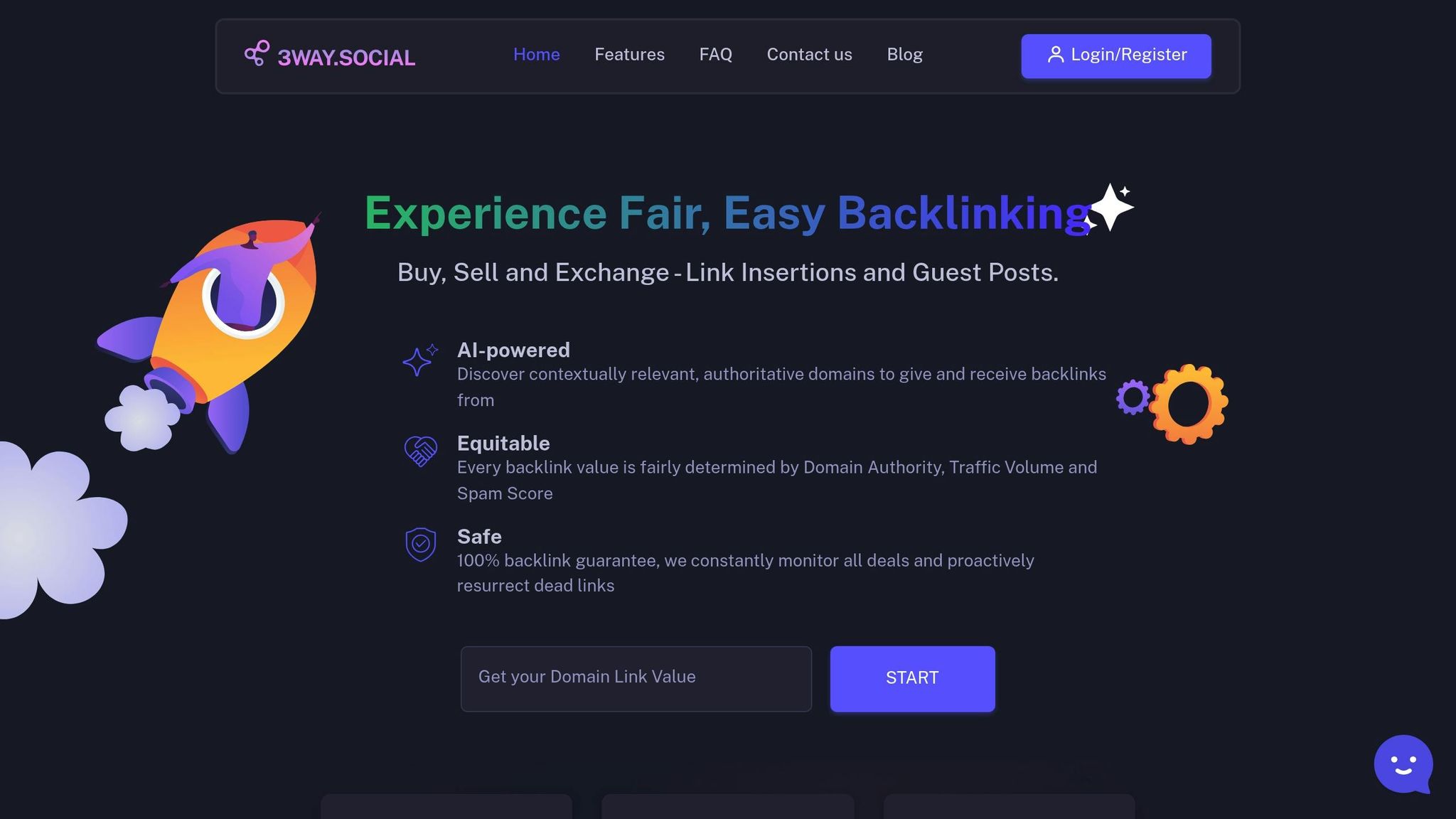Last Updated on July 28, 2025 by Becky Halls
What matters more for SEO: domain authority vs relevance? The answer isn’t black and white. Both play critical roles in determining the value of a backlink, but they serve different purposes.
- Domain Authority (DA): A metric by Moz that predicts how well a site might rank on search engines. Higher DA often means more link equity, but it doesn’t guarantee better rankings if the link lacks contextual alignment.
- Relevance: Measures how closely a backlink aligns with your niche or content. Search engines prioritize relevance for keyword rankings and user engagement.
Key Takeaways:
- High-DA links boost overall authority but may fall short if unrelated to your content.
- Relevant links improve keyword rankings and attract targeted traffic, even from lower-DA sites.
- A balanced approach – combining authority and relevance – yields the best results for SEO.
Quick Comparison:
| Factor | SEO Impact | Traffic Quality | Acquisition Effort | Best Use Case |
|---|---|---|---|---|
| Domain Authority | Broad authority boost | General traffic | Moderate | Building overall site trust |
| Relevance | Niche-specific boost | Targeted traffic | High | Improving keyword rankings |
To succeed, focus on ethical link-building strategies that prioritize quality over shortcuts. Tools like 3Way.Social can help streamline the process by balancing authority and relevance effectively.
Do You Really Need High Domain Authority Links?
Understanding Domain Authority
Domain Authority (DA) is one of the most recognized SEO metrics, but its purpose and limitations are often misunderstood. Grasping how DA works can help you evaluate backlinks more effectively and balance its importance against the relevance of your content.
Definition and Measurement
Domain Authority, developed by Moz, is a scoring system that predicts how well a website might rank in search engine results compared to others. The score ranges from 1 to 100, with higher numbers implying a stronger ability to rank. However, the scale is non-linear, meaning it’s much harder to improve your score as it gets higher. Moz calculates this score using a machine learning algorithm that evaluates the quality and quantity of backlinks. Typically, a DA score between 40 and 70 is considered good, while Ahrefs‘ Domain Rating (DR) often ranges from 60 to 80.
Benefits of High DA Links
Getting links from websites with high DA can improve your SEO in several ways. These links signal to search engines that credible and well-established sources are endorsing your content, which can enhance your rankings. Beyond SEO, they can also drive direct traffic from those reputable sites, thanks to their loyal and engaged audiences. DA also serves as a handy benchmark for comparing your site’s performance within your industry, helping you prioritize link-building strategies. However, it’s important to weigh these benefits against the metric’s limitations.
Limitations of Domain Authority
While DA has its strengths, it’s essential to recognize its drawbacks. First, DA is not a Google ranking factor. Google doesn’t use Moz’s proprietary metric in its algorithm, so focusing too heavily on DA can sometimes mislead your SEO efforts – especially if the links you acquire lack relevance. For example, a link from a high-DA site won’t necessarily help if the content isn’t related to your niche. DA scores can also fluctuate due to changes in backlink profiles, competitor activity, or updates to Moz’s algorithm. These shifts don’t always reflect your actual search performance.
Additionally, many SEO professionals – 42.6% of link builders, to be exact – rely on DA and DR to measure success. While useful, this reliance can cause you to overlook opportunities for contextually relevant links, which might be more beneficial for your rankings.
“A client may say they want their Domain Authority strengthened, but what they really want is higher rankings for the right keywords that bring them new customers. It is possible to increase Domain Authority with spammy link building, but that wouldn’t give the client what they really wanted.”
- Daniel Noakes, One SEO
Understanding Content Relevance
While domain authority often grabs the spotlight in SEO discussions, it’s content relevance that truly drives effective link-building strategies and boosts rankings.
Definition and Importance
In the context of link building, content relevance refers to how well a backlink aligns with the topic, content, or keywords of the page it links to. This alignment not only signals to search engines that the link fits naturally within the content but also reinforces your site’s authority within its specific niche.
For instance, imagine an article on Elle that explains how to recreate a trendy outfit, linking to Shein for clothing suggestions. This is a prime example of a well-placed and contextually relevant backlink. On the other hand, a link to Shein on a coding forum like GitHub would feel completely out of place.
Google prioritizes contextual relevance because naturally integrated links are more useful and intuitive for users. As the search engine puts it, its goal is “to present the most relevant, useful results on the first page”. Relevance is assessed based on factors like the overall theme of the linking site, the anchor text used, and the link’s placement within the content. When these elements align, they create a clear signal of the backlink’s significance.
SEO Benefits of Relevant Links
Backlinks that are relevant to your content often outperform unrelated high-domain-authority links. Why? Because they attract visitors who are genuinely interested in your content, leading to better keyword rankings, higher engagement, and even improved conversion rates.
David Farkas from The Upper Ranks explains it well: “High authority links are great, but in my opinion, relevant links win the game every time. They are truly in their natural habitat and make more sense for users that click on them, hence serving as a stronger ranking signal”. Similarly, Cyrus Shepard from CyrusShepard.com adds, “Without question, I would take a highly relevant link, with low authority. All. Day. Long”.
Relevant backlinks also help establish topical expertise. When respected sites in your niche link to your content, it consolidates your authority on that subject. This sends a strong signal to search engines that your site is a trusted resource. Unlike domain authority, which measures a site’s overall strength, relevance focuses on contextual alignment, making it a cornerstone of ethical link-building.
Challenges with a Relevance-Only Focus
Despite its clear benefits, focusing solely on relevance comes with challenges. One of the biggest hurdles is scalability – there’s a finite number of highly relevant sites within any given niche.
Finding these opportunities often demands extensive research and relationship-building. You’ll need to identify websites that align with your industry and build connections with their owners. Additionally, some niches have limited online representation or fewer authoritative sites willing to link out.
Another challenge is content creation. With 65% of content creators admitting they struggle to produce engaging material, crafting content that attracts niche-specific backlinks can require significant effort and deep industry knowledge.
Focusing exclusively on relevance can also create an echo chamber. By targeting only similar sites, you might miss out on opportunities to reach new audiences or establish authority in related markets. While Google tends to ignore irrelevant links, dismissing all non-relevant links outright could mean passing up valuable SEO opportunities. Striking the right balance between relevance and authority is essential, setting the stage for a deeper comparison of these two metrics.
sbb-itb-88880ed
Domain Authority vs. Relevance: Direct Comparison
Now that both factors are defined, let’s dive into a direct comparison to better understand how they influence backlink evaluation. Examining their strengths and weaknesses side by side provides a clearer picture of their roles in SEO.
Strengths and Weaknesses of Each Factor
Domain Authority (DA) offers clear benefits. Links from high-DA sites can boost your overall authority and pass significant link equity, giving your site a noticeable SEO lift. These sites are trusted by search engines, so their endorsement is like a stamp of approval from a respected figure in your industry. However, DA has its limitations – if the links lack relevance, they might not improve keyword rankings and could even lead to penalties.
Content relevance, on the other hand, thrives where DA might fall short. Backlinks from relevant sources establish your authority in a specific niche, improve keyword rankings, and attract more targeted traffic. Visitors from contextually related sites are more likely to engage with your content, increasing the chances of conversions. However, low-DA relevant sites may not pass as much link juice, and acquiring these links often requires more effort, such as personalized outreach or collaboration.
Here’s a practical example: A travel blog getting a backlink from a high-DA technology site might see a general boost in authority, but it won’t necessarily help with rankings for travel-specific keywords. Now, if that same blog secures a backlink from a smaller, niche travel site, it could rank better for terms like “budget travel tips” and attract more relevant visitors. Striking the right balance is crucial for ethical link-building and sustainable SEO growth.
DA vs. Relevance Comparison Table
| Factor | SEO Impact | Trust Building | Ranking Potential | User Engagement | Acquisition Effort | Risk Level |
|---|---|---|---|---|---|---|
| High DA | Broad authority boost | Strong credibility | General improvement | Low if irrelevant | Moderate | High |
| Relevance | Niche authority boost | Industry-specific trust | Strong for keywords | High engagement | High | Low |
| Traffic Quality | Variable | Established reputation | Immediate visibility | Depends on relevance | Depends on strategy | Spam concerns |
| Long-term Value | Sustained authority | Brand association | Competitive edge | Higher conversions | Relationship building | Algorithm-friendly |
The takeaway? Both factors play distinct but complementary roles in SEO. As David Farkas from The Upper Ranks explains:
“Both relevance and authority matter. Both should be evaluated in link-building. But if I have to choose one to focus on, I would take relevance any day over domain authority”.
This highlights a key point: while a high-DA backlink may boost your authority, a relevant backlink often has a greater impact on your keyword rankings and overall SEO performance. That doesn’t mean you should disregard DA altogether. The ideal strategy is to find opportunities that combine both factors. A balanced backlink profile – with a mix of high-DA and low-DA links from relevant sources – appears more organic and trustworthy to search engines. This approach ensures immediate authority gains while laying the groundwork for long-term SEO success.
How to Assess Link Value Fairly
Assessing backlinks effectively requires a balanced approach that considers both domain authority and relevance. This method not only supports SEO growth but also aligns with ethical practices for long-term success.
Balancing Domain Authority and Relevance
A strong backlink strategy hinges on finding the right mix of domain authority (DA) and relevance. Neither factor should completely overshadow the other. Research shows that 84.6% of SEO professionals prioritize link relevance, while 68.3% value domain authority highly.
For the best results, aim for links from high-authority sites within your niche (e.g., DA 50+). These links can boost your site’s credibility and reinforce its expertise . However, don’t overlook the importance of diversity – high-DA links contribute to overall authority, while relevant links help target specific keywords effectively.
Josh Brown, Digital Marketing & SEO Consultant at Helpjuice, highlights the importance of this balanced approach:
“Ethical link building helps create a solid foundation for your website that helps minimize the risks of getting your site hit with a penalty or seeing a massive drop in rankings when search engines like Google make algorithmic changes.”
By combining high-DA links with niche-relevant ones, you can achieve both short-term improvements and long-term stability in your SEO efforts.
Using AI-Powered Tools like 3Way.Social

Managing the balance between authority and relevance can be challenging, but AI-powered tools like 3Way.Social simplify the process. These tools automate backlink matching, saving time and effort.
3Way.Social uses AI to evaluate potential link partners based on factors like DA scores, niche relevance, and content quality. This makes it easier to identify websites that meet both authority and relevance criteria. The platform also ensures fair exchanges by considering the domain metrics and content relevance of both parties.
Some standout features include:
- Permanent do-follow links
- Advanced link diversification
- A secure, vetted SEO network
By leveraging tools like this, you can build natural, high-quality backlink profiles while safeguarding your site’s reputation.
Best Practices for Ethical Link Building
Beyond metrics and tools, ethical practices are essential for sustainable SEO success. Focusing on quality over shortcuts ensures lasting benefits.
One proven approach is content-driven link attraction. Creating high-quality, valuable content – such as original research, detailed guides, or industry insights – naturally attracts backlinks. In fact, studies show that long-form content earns 77.2% more links than shorter pieces.
Guest posting is another effective strategy. By contributing valuable content to reputable sites in your niche, you can establish authentic relationships and earn backlinks. Similarly, broken link building offers a win-win: identify broken links on authoritative sites and suggest your content as a replacement.
Melih Ozlatay, CEO of Smartfinds Internet Marketing, underscores the importance of ethical link building:
“We find that sticking to ethical link-building is the best way to succeed. With important clients, there’s no room for black hat tactics. We always suggest a steady and reliable approach, using guest blogging, press releases, and getting our clients mentioned by journalists, reporters, and influencers. It’s better to move slowly but surely.”
To maintain a healthy backlink profile, regularly monitor it using tools like Ahrefs, SEMrush, or Moz. These tools can help identify harmful or irrelevant links that need to be addressed. Transparency and disclosure are also critical for building trust with users and search engines alike.
Ultimately, focus on building genuine relationships with industry peers and authoritative sites. Strong connections often lead to natural link opportunities and collaborative content that benefits everyone involved.
Conclusion
Looking at the comparisons above, one thing is clear: blending metrics like domain authority and relevance is essential for ethical SEO. Neither stands alone as the ultimate solution. Instead, the key lies in striking a balance between the two for a well-rounded strategy that delivers lasting results.
Key Points Summary
Balancing domain authority with content relevance creates a strong link profile that supports long-term SEO success. While authority boosts rankings and credibility, relevance ensures your links attract the right audience. These aren’t competing priorities; instead, they work together to drive both traffic and trustworthiness.
Amy Merrill from Page One Power captures this complexity perfectly:
“Although I would love, just for the sake of conversation, to draw a hard line in the sand and radically shout a decisive winner between relevance and authority, it is and always will be a sliding scale filled with exceptions and nuance – just like SEO and link building should be. That’s ultimately why a human element is so essential, because truly great SEO work takes human thought and critical thinking.”
By combining high-authority links with relevant ones, you can enjoy both immediate SEO benefits and long-term sustainability. This balanced approach is the cornerstone of ethical link building.
Final Thoughts on Ethical SEO Practices
Achieving sustainable SEO success means prioritizing ethical, quality-driven link building. With 58.4% of SEO experts rating links as a major factor in rankings, it’s tempting to chase shortcuts. But focusing solely on either authority or relevance can lead to missed opportunities. The best strategies find harmony between the two, boosting visibility and improving rankings over time.
Ethical link building is rooted in transparency, meaningful relationships, and creating real value. Search engines reward links that genuinely benefit users, while authoritative and relevant backlinks enhance user experience and signal quality.
Ultimately, great SEO requires human insight. While tools like 3Way.Social can help identify strong link opportunities, decisions about balancing authority and relevance demand industry knowledge and thoughtful strategy.
Top-performing link builders focus on creating content that naturally earns links, fostering relationships within their industry, and sticking to ethical practices. This not only improves rankings but also builds trust with both users and search engines. And trust, in the end, is the foundation for lasting SEO success.
FAQs
What’s the best way to balance domain authority and relevance in link building?
When building backlinks, aim for links from websites that are both credible and closely related to your content’s topic. This way, the links not only strengthen your site’s authority but also align with the interests of your audience and search engine expectations.
For a streamlined and safe process, tools like 3Way.Social can be a game-changer. These AI-driven platforms connect you with trusted partners for natural, high-quality link exchanges, helping you improve relevance and authority without compromising efficiency.
Why can a link from a lower domain authority site sometimes be more valuable than one from a higher domain authority site?
Not all backlinks are created equal. Sometimes, a link from a site with lower domain authority can pack a punch if it’s highly relevant to your niche or audience. Why? Because relevance often translates to better-targeted traffic, more engagement, and stronger trust signals in the eyes of search engines.
On top of that, these links can add variety to your backlink profile, making it look more natural and less prone to over-optimization. Search engines care more about quality and context than just raw authority. A well-placed, relevant link can still make a noticeable difference in boosting your SEO.
What are the best ethical link-building strategies to boost both domain authority and content relevance?
To improve both domain authority and content relevance in an ethical way, concentrate on crafting high-quality content that naturally draws backlinks. Aim to build authentic connections with respected websites in your niche, focusing on earning links from sources that closely align with your content’s subject.
You can also explore strategies like guest post collaborations, joining industry conversations, and maintaining transparency in any link exchanges. Ultimately, it’s the quality and relevance of links that drive lasting SEO success, not sheer numbers.



